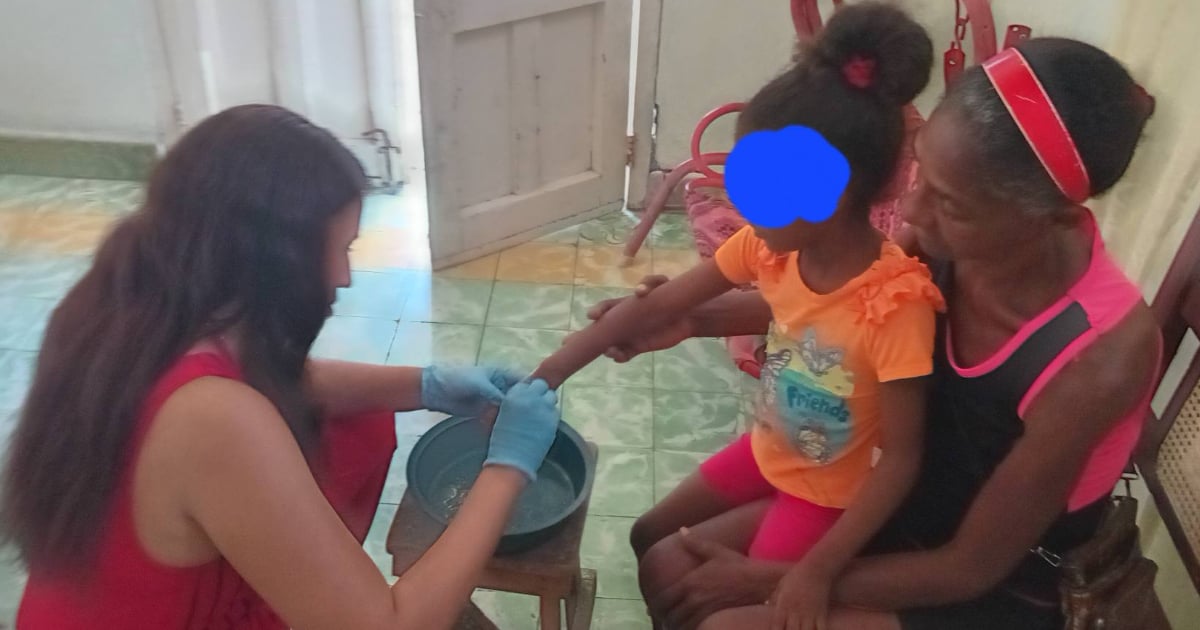Amidst the challenging conditions in Cuba, prominent opposition figure Jose Daniel Ferrer and his wife, Dr. Nelva Ismaray Ortega, have amplified their humanitarian efforts in Santiago de Cuba by offering daily assistance to those in need. In a recent post on X, Ferrer explained how they balance their charitable work with family life despite the obstacles imposed by the government.
"While my wife, Dr. Nelva Ismaray Ortega, attends to patients and other matters, I spend my day helping dozens of people: relatives of political prisoners, phone calls from political and common prisoners, activists who have suffered repression or face serious issues. Despite the numerous challenges imposed by the regime, we lovingly care for our son. I'm making him a puree of malangas, which are quite expensive," Ferrer shared.
Photos shared online illustrate Dr. Ortega's dedication to those in need. In one image, she is seen tending to a young girl's wound as an elderly woman holds the child. Another picture shows her checking an elderly woman's blood pressure in an outdoor setting, with another person waiting nearby. Additionally, there's an image of her engaging in conversation with another elderly woman, seemingly offering medical assistance or support.
Their efforts have been acknowledged by various sectors of society, highlighting their contribution amid increasing shortages and repression. However, their actions have not gone unnoticed by the Cuban government, which has frequently restricted their movement and communication.
Ferrer, the leader of the Patriotic Union of Cuba (UNPACU), was released on January 16 after spending three and a half years in prison. His release was part of an agreement involving the Cuban regime, the Vatican, and the United States, which included the gradual release of 553 political prisoners. Despite being freed, Ferrer continues to face harassment from Cuban authorities. On January 27, he refused to comply with a police summons in Santiago de Cuba, asserting that he would not be intimidated by the threat of imprisonment.
In February, Ferrer was summoned again by the Popular Municipal Court of Santiago de Cuba. He stated that he does not recognize the court's authority and is willing to face the consequences of his refusal to comply. Ferrer has also reported continuous surveillance by the political police, including the use of drones to monitor his home in Santiago de Cuba. Despite these threats, he remains committed to advocating for human rights and the welfare of the Cuban people.
Ferrer has openly criticized the agreement that led to his release, expressing no gratitude towards negotiations that he believes benefit the dictatorship. He has emphasized his willingness to die in prison rather than owe his freedom to an unworthy negotiation.
The humanitarian work led by Ferrer is not a recent development. In 2021, state officials attempted to prohibit UNPACU from distributing food to those in need in Santiago de Cuba, citing health reasons related to the pandemic. Ferrer defied the order, asserting that his organization provided more medicine and food than the province's public health system. "Everyone who comes here will continue to receive food," he declared at the time.
Frequently Asked Questions about Jose Daniel Ferrer's Humanitarian Efforts
What type of assistance do Jose Daniel Ferrer and his wife provide in Santiago de Cuba?
Jose Daniel Ferrer and his wife, Dr. Nelva Ismaray Ortega, provide daily support to vulnerable individuals, including medical assistance and support for families of political prisoners and activists facing repression.
How has the Cuban government responded to Ferrer's activities?
The Cuban government has frequently monitored and restricted Ferrer's movements and communication, and he has faced harassment from authorities despite being released from prison.
Why was Jose Daniel Ferrer released from prison?
Ferrer was released as part of a tripartite agreement involving the Cuban regime, the Vatican, and the United States, which facilitated the gradual release of 553 political prisoners.
